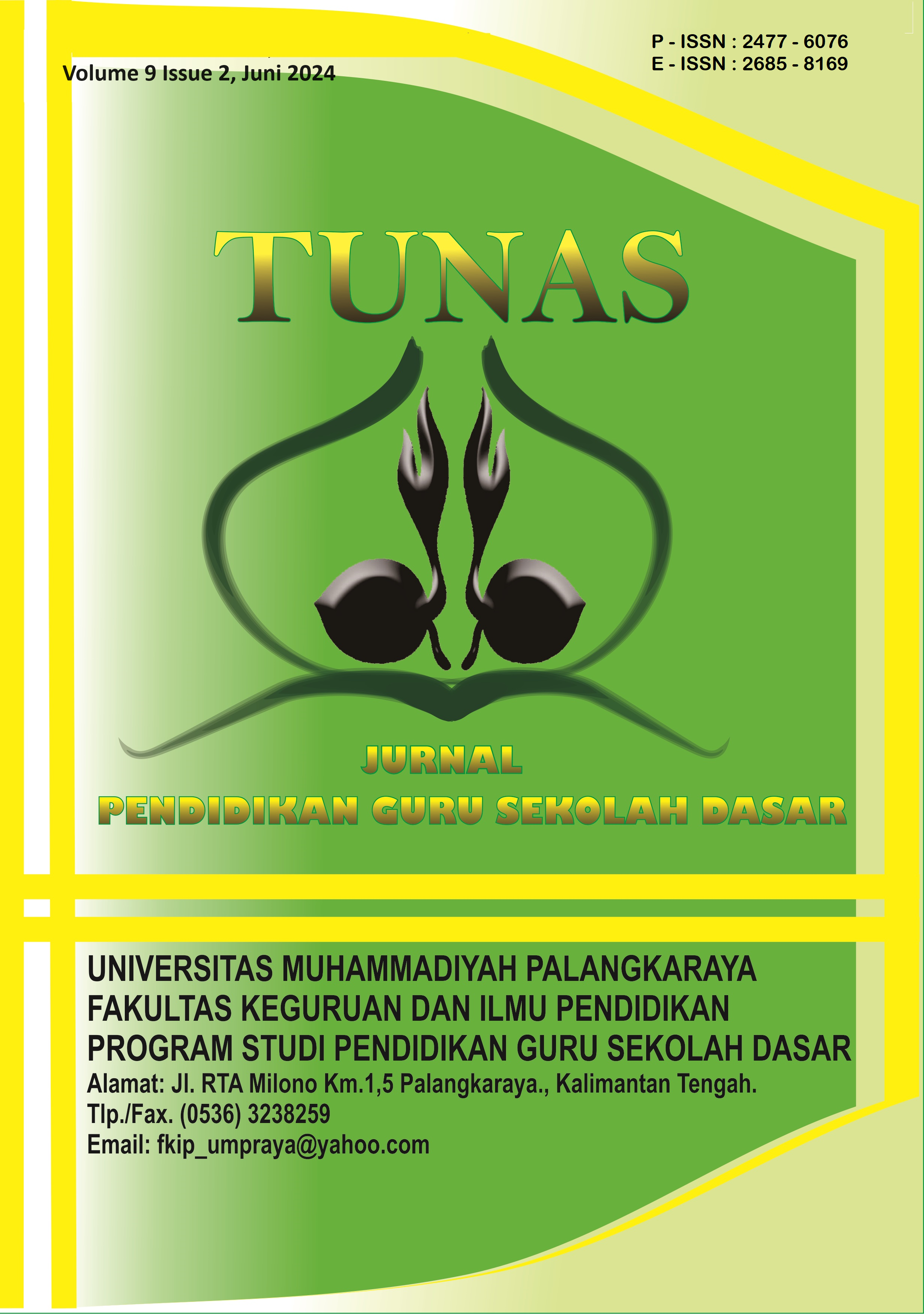Efforts to improve mathematics learning outcomes using the Realistic Mathematics Education (RME) learning model assisted by student number card media Class IV SDN-1 New Kasongan
Main Article Content
Abstract
Background: Mathematics is a universal science that underlies the development of modern technology, has an important role in various disciplines and advances human thinking. There are still many students who seem less motivated, The results of initial observations at SDN-I Kasongan Baru show that interest in learning is low and tends to do things that are beyond their obligations as students, both in the learning process in class and outside the classroom. So the researcher concluded the need to apply a realistic mathematics education learning model assisted by card media to improve student learning outcomes. Objectives: This study aims to: (1) Determine the Mathematics learning activities of students and teachers using the Realistic Mathematics Education (RME) learning model in grade IV SDN-1 Kasongan Baru, (2) find out the improvement of learning outcomes with the Realistic Mathematics Education (RME) learning model. Method: This study uses the type of PTK research with the Realistic Mathematics Education (RME) research model. This research was carried out in grade IV of SDN-1 Kasongan Baru in the even semester of the 2023 academic year with the subjects of the study being 21 grade IV students. Data collection is carried out by Observation and Test methods. Data analysis uses qualitative and quantitative. Results and Dıscussion: The results showed that: 1) teacher and student activity after the observation results in cycle I showed that the average activity score of teachers and students was in the range of scale 2.7 and 2.9 with a fairly good category while in cycle II the observation results of teachers and students increased in the range of 3.3 and 3.3 with good category, 2) there is an improvement in Mathematics learning outcomes after applying the Realistic Mathematics Education (RME) learning model in grade IV SDN-1 Kasongan Baru. Conclusion: The realistic Mathematics Education (RME) learning model assisted by number card media can improve the mathematics learning outcomes of grade IV students of SDN-I Kasongan Baru.
Downloads
Article Details

This work is licensed under a Creative Commons Attribution-ShareAlike 4.0 International License.
Authors who publish with this journal agree to the following terms:
- Any article on the copyright is retained by the author(s).
- The author grants the journal, right of first publication with the work simultaneously licensed under a Creative Commons Attribution License that allows others to share work with an acknowledgment of the work authors and initial publications in this journal.
- Authors are able to enter into separate, additional contractual arrangements for the non-exclusive distribution of published articles of work (eg, post-institutional repository) or publish it in a book, with acknowledgment of its initial publication in this journal.
- Authors are permitted and encouraged to post their work online (e.g., in institutional repositories or on their websites) prior to and during the submission process, as can lead to productive exchanges, as well as earlier and greater citation of published work.
- The article and any associated published material is distributed under the Creative Commons Attribution-ShareAlike 4.0 International License
References
Ahmad Zainullah. (2017). The Effect of Realistic Mathematics Education (RME) Learning on Mathematics Learning Outcomes of Grade IV Students of Cluster V Situbondo Regency, Vol: 5 No: 2, 2017, p. 8.
Bone, A. M. (2021). Media cards to improve primary school math learning outcomes. JEER: Journal of Elementary Educational Research Vol 1 (1): 1-8.
Dahar, R. W. (2012). Theories of Learning and Learning. Jakarta: Erlangga.
Martini, N., Putra, C. A., & Rahmaniati, R. (2023). Implementation of Strengthening Character Education in Pancasila Education Learning . International Journal of Universal Education, 1(2), 56–60. https://doi.org/10.33084/ijue.v1i2.6930
May Shandy. (2016). Realistic Mathematics Education (RME) to Improve Learning Outcomes of Primary School Students, Journal of Primary School Teacher Education, Vol. 1 No. 1, December 2016, p. 57.
Misyanto, M. (2015). Pengaruh Manajemen Kelas dan Motivasi Belajar Terhadap Hasil Belajar Matematika. Anterior Jurnal, 14(2), 186-193.
Mone. (2018). Accessing and monitoring the mathematical creative thinking skills of grade V elementary school students in mathematics learning. PRISMA Journal, 99
Reys, Effendi. (2014). Causative factors of low learning outcomes. Yogyakarta: Student Libra
Safitri, N., & Misyanto, M. (2019). Upaya Meningkatkan Hasil Belajar Matematika dengan Menggunakan Model Pembelajaran Snowball Trowing dan Metode Demonstrasi dengan Berbantuan Media Konkret Kelas IIIB DI SDN 8 Langkai Palangka Raya Tahun Pelajaran 2017/2018. Tunas: Jurnal Pendidikan Guru Sekolah Dasar, 4(2), 42–54. https://doi.org/10.33084/tunas.v4i2.909
Saraseila, F., Karjiyati, V., &; Agusdianita, N. (2020). The influence of the Realistic Mathematics Education model on the mathematical literacy ability of grade V students of Cluster XIV Elementary School in Bengkulu City. Journal Math-Umb.Edu, 7(2).
Sari, E., Bulkani, B., & Rahmaniati, R. (2023). The Effect of Using the STAD (Student Teams Achievement Division) Cooperative Model Assisted by Finger Puppets on Students’ Learning Motivation. International Journal of Universal Education, 1(2), 61–68. https://doi.org/10.33084/ijue.v1i2.6949
Setyawan, D., Astuti, A. D., & Ni’mah, N. (2023). Analysis of Mathematics Learning in the Implementation of The Merdeka Curriculum at Muhammadiyah Palangka Raya Integrated Islamic Elementary School. Tunas: Jurnal Pendidikan Guru Sekolah Dasar, 9(1), 29–33. https://doi.org/10.33084/tunas.v9i1.6339
Syifa, F. F., Ali, M. M &; Hendri, H. (2019). Learning media, math cards, ability to understand mathematical concepts, self efficacy. Journal of Integrals Vol 10 (2) : 1-12
